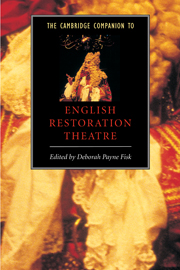Book contents
- Frontmatter
- 1 The theatre
- 2 The performance
- 3 Adaptations and revivals
- 4 Comedy
- 5 Tragedy
- 6 Tragicomedy
- 7 Farce
- 8 Restoration and settlement
- 9 Change, skepticism, and uncertainty
- 10 Drama and political crisis
- 11 Spectacle, horror, and pathos
- 12 Gender, sexuality, and marriage
- 13 Playwright versus priest
- 14 The canon and its critics
- Biographies and selected bibliography
- Index
12 - Gender, sexuality, and marriage
Published online by Cambridge University Press: 28 May 2006
- Frontmatter
- 1 The theatre
- 2 The performance
- 3 Adaptations and revivals
- 4 Comedy
- 5 Tragedy
- 6 Tragicomedy
- 7 Farce
- 8 Restoration and settlement
- 9 Change, skepticism, and uncertainty
- 10 Drama and political crisis
- 11 Spectacle, horror, and pathos
- 12 Gender, sexuality, and marriage
- 13 Playwright versus priest
- 14 The canon and its critics
- Biographies and selected bibliography
- Index
Summary
The plots of Restoration drama begin, develop, and end in concerns about gender, sexuality, and marriage. The demarcation of masculine and feminine domains, the desire of one sex for the other, and the institutions charged with legitimizing both, become the amusing foils or dire impasses that comprise the action and envelop the characters of the plays of this era. Other cultural concerns are neither ignored nor dismissed; rather, the social, political, historical, and personal are imagined and played out primarily through this narrow dramatic focus. Gender, sexuality, and marriage emerge as comically or tragically disordered states whose permutations must be worked through in order to achieve personal goals, to consolidate families, to re-establish social order, to restore political stability, and to secure cultural cohesion. The reliance on such constricted and redundant dramatic tropes is rare if not unique in English theatrical history.
Although all of Restoration drama is preoccupied with gender, sexuality, and marriage, the comedy of manners is perhaps the most exemplary. A type of drama that observes with satiric amusement the deportment, wit, and morality of contemporary society, the comedy of manners flirts with a number of developing and unresolved social tensions. In comic fashion, the plays broach and endeavor to resolve serious cultural concerns, such as the definition of gender roles, the regulation of sexual behavior, the characteristics of class, and the compatibility of marriage partners.
- Type
- Chapter
- Information
- The Cambridge Companion to English Restoration Theatre , pp. 191 - 208Publisher: Cambridge University PressPrint publication year: 2000
- 3
- Cited by



